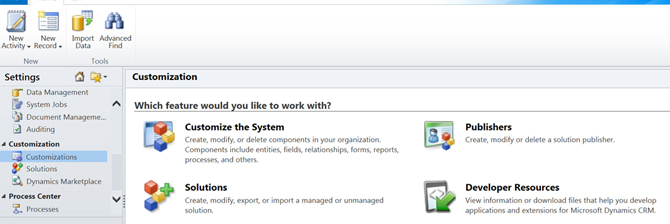Everyone knows customer relationship management (CRM) is important. It’s the main source behind lead conversion and revenue recognition for many companies. But using many of the CRM systems available can be difficult. Especially because out of the box, they might not fit your needs. If that’s the case, you should consider customizing the system. It’s easier than you think.
hat’s the great thing about CRM systems today – they can easily be customized to your organization’s business model. However, along with the positives of easy point-and-click customizations, such as new data fields, also comes the increased risk of creating useless and unreliable data. In a recent article I read The Five Data Management Practices B2B Marketers Are Overlooking, author Derek Slayton cites research from the Aberdeen Group that says companies that actively manage their marketing data for hygiene and improved segmentation require just 64 marketing responses to generate a customer. Those that do not require 329 (industry average) or 622 (laggards) touches!
The purpose of data fields in your CRM is to store data on CRM objects (leads, contacts, accounts, opportunities, etc.) that are important to successful lead generation and tracking of your organization’s success. As Derek Slayton stated, “Consider data the fuel of your marketing engine.” They are used to track sales opportunities and potential revenue for the upcoming year, won and lost sales from the prior year, estimated timelines for converting a prospect into a client through the sales pipeline, influencers in a buying decision and numerous other things.

When creating a new data field in CRM, here are a few things to consider:
- Team Consensus: Make sure your team agrees with the data field being created and the purpose behind it. Ask your team, “How will this data benefit in our lead generation activities?” and “How will this help in generating revenue for the company?” Continually adding new data fields without planning or consensus can result in unused or redundant fields and a system so complex no one knows how to use it.
- Usage Guidelines: Have your team set rules and guidelines behind the data field. Make sure you agree on things such as data type, business rules, naming convention, usage, quality, etc. When guidelines are not tied to a new data field from the beginning, every individual using the field will create their own personal guidelines and processes. This creates inconsistent data. A great tip from the article is to establish standards and work with your marketing and sales teams to ensure that all constituents have the same expectations for data quality. Clarity for what is expected and agreement on goals as an organization are critical to your go-forward strategy.
- Permissions: Custom data fields that may contain sensitive information should have permissions set. Using a type of role-based security, you typically have the option and ability to choose whether to make the field visible to certain user roles and restrict edibility of the field. Each CRM varies with their security features, but this is always a vital step.
Data fields are important to the evaluation of aggregate data as well as the ease-of-use of your CRM system. It’s important to not get carried away and create data fields for every bit of information you would like to gather. Put emphasis on evaluating the necessity of each data field and the quality of data being entered. Derek Slayton’s article tells us to remember to establish a process to assess, cleanse, and enrich your data regularly throughout the year. Their research shows that marketing data decays at approximately 3% per month—and your inbound channels introduce hundreds (or thousands) of new records over the same time frame. This is similar to having a governance process for content on your website, you want to make sure it’s always displaying up-to-date and valuable information to your users.
Few things connect verticals like well-kept CRM systems. Whether you’re a local brick-and-mortar shop, a B2B business, or even a healthcare organization, at the end of the day effective customer relationship management is likely an important part of your marketing and sales strategy.
Transcript

